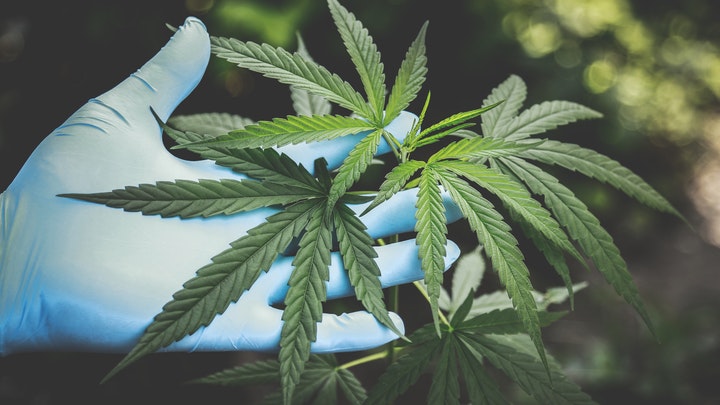It has been well researched that those with a history of cannabis use are also at a much greater risk of developing a severe mental health issues in the future.
These mental health issues include anxiety, depression and other mental health issues such as paranoia, schizophrenia and psychosis [1].
Cannabis is one of the most highly abused drugs in the UK, with more and more people each year becoming addicted.
Not only are people with addiction more likely to develop mental health issues, but people with mental health issues are also more likely to turn to drugs like cannabis in their time of need [2].
When looking into the link between cannabis and mental health issues, it is important to understand exactly what cannabis is and how it affects the brain and mental health.

Cannabis is a highly addictive drug that is also illegal. It is derived from the cannabis plant, which is either smoked or eaten. Lots of people smoke cannabis, which they roll up into a joint.
Others add cannabis to their food, such as brownies, whilst others add it to their drinks.
Cannabis is the most highly abused drug throughout the UK, with a lot of young people taking up the unhealthy habit at a very young age.
It has lots of different names, including:
Whilst cannabis might have different names, the side effects are always the same. People will feel a slight euphoric high before then experiencing a comedown, where they’ll start to feel lazy, depressed and anxious.
Millions of people across the world are now abusing cannabis. There are lots of different reasons why someone might consume cannabis.
Some of the most common reasons why someone might consume cannabis is to relieve themselves of their mental health issues, physical illness or simply boredom.
If you think you are addicted to cannabis, then you should talk to your local GP or to a member of the Rehab 4 Addiction team in order to get the help that you need before your addiction takes over your life.

When an individual consumes cannabis, it takes effect on the brain almost immediately. As soon as you smoke or consume cannabis, it will enter your bloodstream.
Once the cannabis enters the bloodstream, it will be carried through the body very quickly to the brain, where it is then received by receptors in your brain.
Once the cannabis has been received by the receptors, it will then start to take hold of your actions, behaviour and mood.
Cannabis has this effect on the brain because it contains a chemical called cannabinoid. This is also known as cannabidiol, CBD and THC.
THC is the active ingredient in cannabis and the more THC, the stronger and more intense the effects will be.

It has now been proven through many studies that cannabis can cause a series of mental health issues, and it can also make pre-existing mental health conditions considerably worse.
Those individuals who are already likely to develop a mental health issue due to societal factors are also a lot more likely to develop a mental health issue if they consume cannabis.
These risk factors include undergoing trauma, having a member of the family who suffers from a mental health issue or depression or stress.
Cannabis makes a lot of people feel unmotivated and sluggish, often causing people to not want to attend work or social events which can contribute to mental health issues.
Likewise, it makes individuals hallucinate and experience amnesia and depersonalisation which also contribute to poor mental health.
A lot of people also struggle to sleep, whilst feeling increasingly anxious day to day. Cannabis also has an effect on your senses, such as your sight, taste and hearing.
A hallucination is also a form of psychosis, which is a symptom of a very serious mental health issue. Other forms of psychosis include schizoaffective disorder and bipolar disorder.

Many studies have now determined the link between cannabis consumption, schizophrenia and psychosis.
Schizophrenia is a very serious and chronic mental health issue, with a lot of complexities. Someone with schizophrenia will experience hallucinations and delusions on a frequent basis.
They will begin to withdraw from friends and family members and will begin to struggle with their memory whilst beginning to struggle in everyday life [5, 6].
Despite what many people believe, schizophrenia is not similar to bipolar or multiple personality disorder. Instead, someone with schizophrenia simply struggles to tell and understand what is real and what is not real. In a sense, they struggle to grasp reality.
Their thoughts become confused, and as a result, their behaviour becomes confused and out of the ‘norm.’ When they start to feel this way, doctors will refer to this state of mind as a psychotic episode.
Lots of studies and tests have now proven that consuming cannabis does in fact lead to an increase in the chances of developing schizophrenia [3].
A recent study showed that smoking marijuana on a daily basis makes individuals five times more likely to develop schizophrenia than someone who has never consumed cannabis before in the past [4].

If you think you are suffering from an addiction to cannabis and are worried about your mental health, then you need to seek help as soon as possible.
The biggest step you can take today is by talking to someone about your addiction and any mental health issues that you might suffer from. You can talk to a friend, a colleague or a family member.
Alternatively, you can talk to a member of the team at Rehab 4 Addiction for advice and support. You can also talk to your local GP, your local drug and alcohol team or a therapist.
There is a wide range of people who can help you understand your addiction and mental health issues better. They will also suggest a range of treatment options and advice on how to recover in a safe and measured way.
It’s important to remember that mental health issues are always likely to get better and improve if they are talked about in the open and shared.
Only then can you get the help and treatment you need, and deserve. The quicker you can get the treatment you need, the more likely you are to recover quickly.
If you are unable to pay for private therapy and treatment, then you will need to be prepared to wait a while until you get through the waiting lists.
Whilst you’re waiting, there are a number of things you can do to help yourself improve slightly in the meantime. For example, you should try to stop smoking cannabis, or cut back significantly if you can.
You could always try to set goals for yourself, avoid buying any cannabis and avoid hanging around with people who smoke or consume cannabis, or avoid attending events or going to places where you know other people will be consuming cannabis.
If you’re suffering from a mental health issue alongside an addiction to cannabis, then speak to a member of the team at Rehab 4 Addiction today.
Our friendly, confidential and helpful team will highlight your treatment options and provide you with help and support.
Speak to a member of the Rehab 4 Addiction team on 0800 140 4690 or by visiting us online at www.rehab4addiction.co.uk.
[2] Lev-Ran S, Le Foll B, Mckenzie K, George TP, Rehm J. Cannabis use and cannabis use disorders among individuals with mental illness. Compr Psychiatry. (2013) 54:589–98. doi: 10.1016/j.comppsych.2012.12.021
[3] Campolongo P, Trezza V, Cassano T, et al. Perinatal exposure to delta-9-tetrahydrocannabinol causes enduring cognitive deficits associated with alteration of cortical gene expression and neurotransmission in rats. Addict Biol. 2007;12(3-4):485-495. doi:10.1111/j.1369-1600.2007.00074.x
[4] Di Forti M, Quattrone D, Freeman TP, et al. The contribution of cannabis use to variation in the incidence of psychotic disorder across Europe (EU-GEI): a multicentre case-control study. The Lancet 2019;6(5);427-436 doi. 10.1016/S2215-0366(19)30048-3
[5] Mccutcheon RA, Reis Marques T, Howes OD. Schizophrenia-an overview. JAMA Psychiatry. (2019) 77:201–10. doi: 10.1001/jamapsychiatry.2019.3360
[6] Powell CM, Miyakawa T. Schizophrenia-relevant behavioral testing in rodent models: a uniquely human disorder? Biol Psychiatry. (2006) 59:1198–207. doi: 10.1016/j.biopsych,.2006.05.008